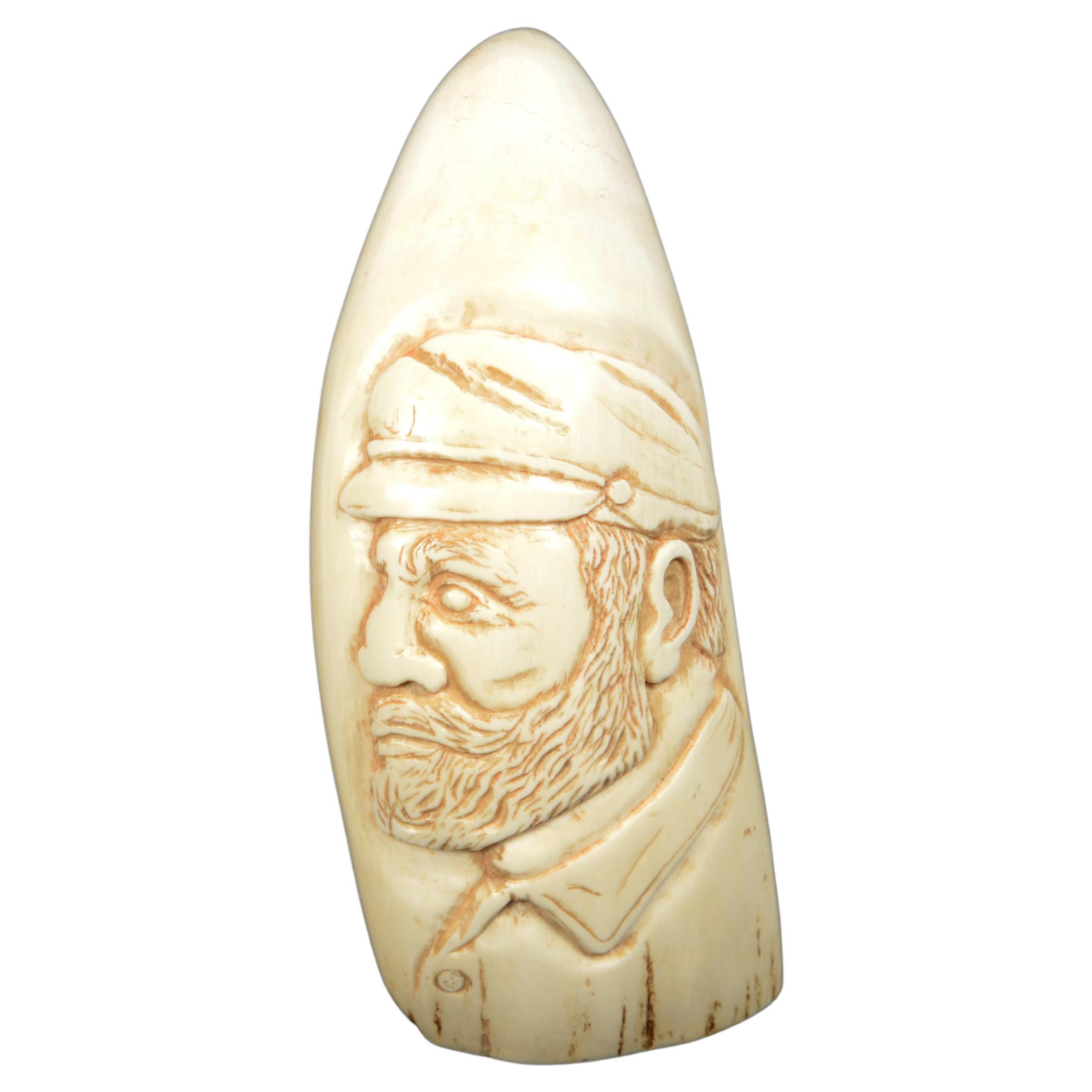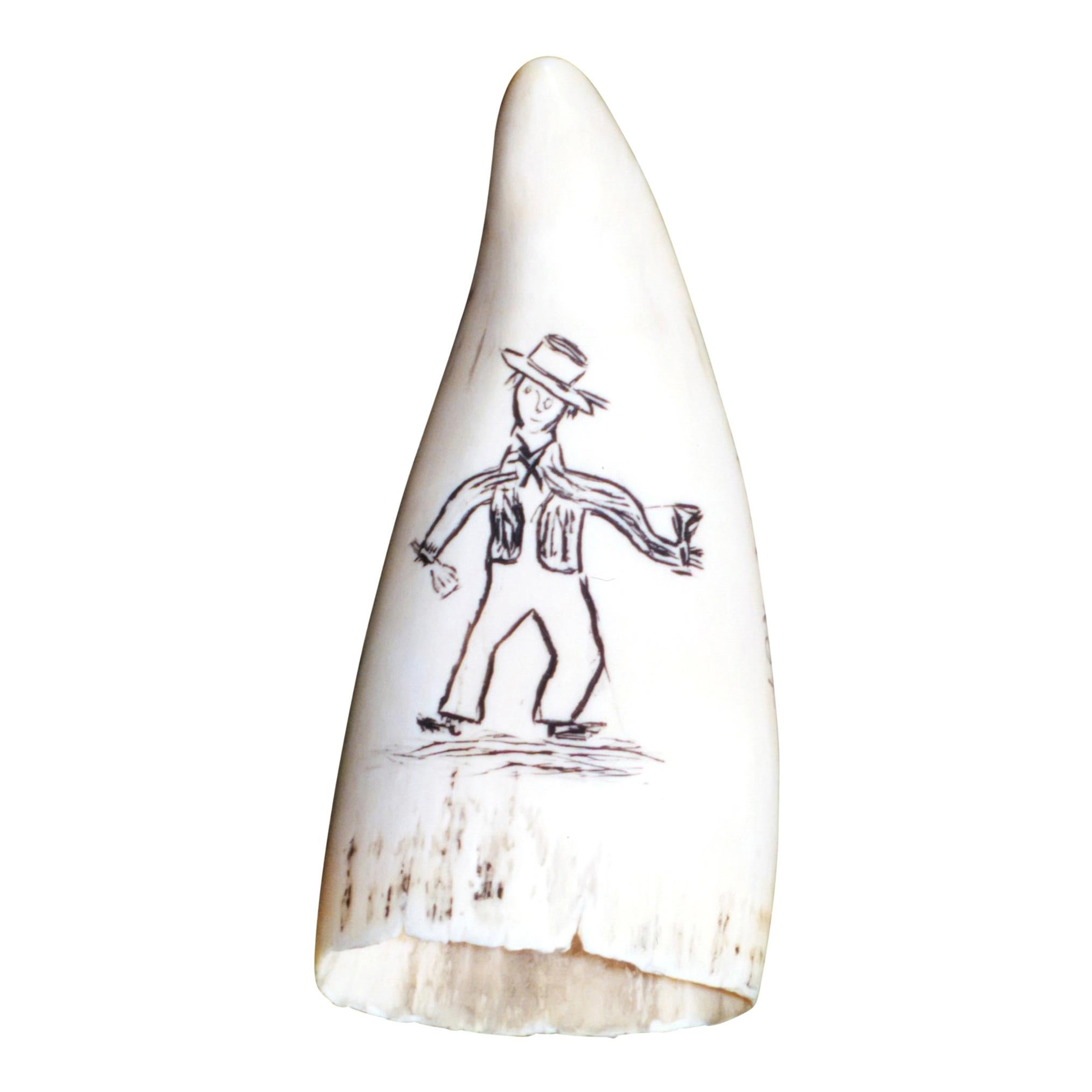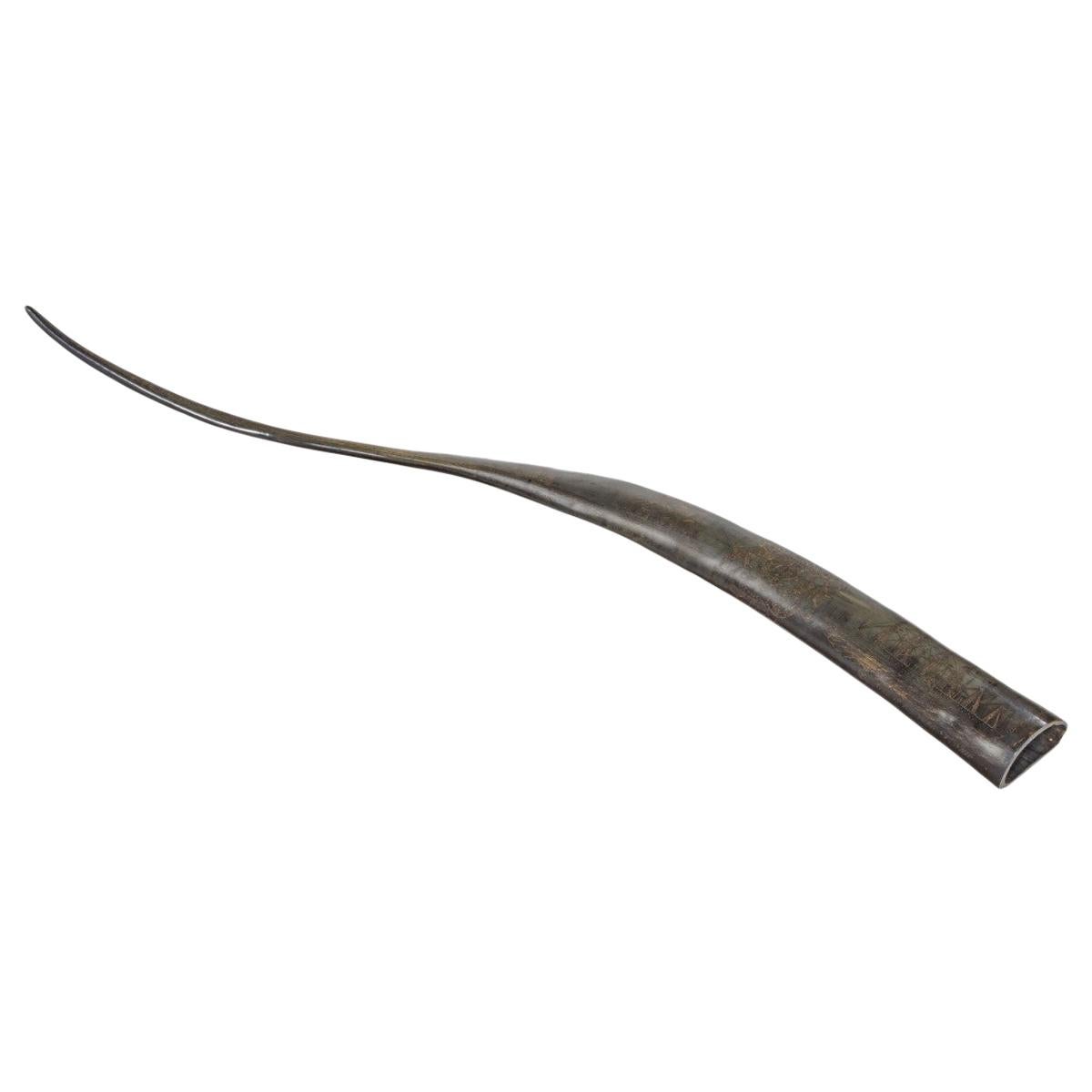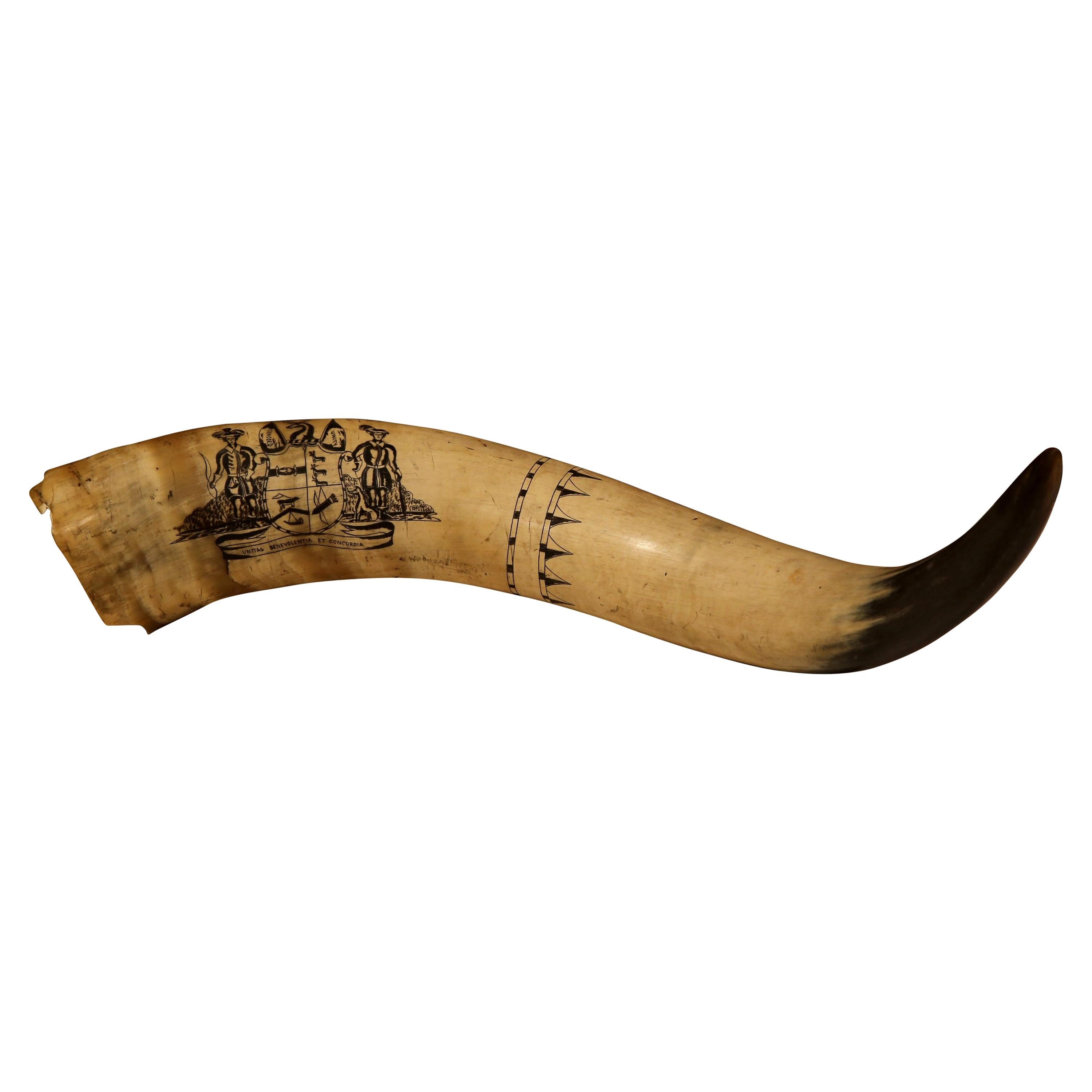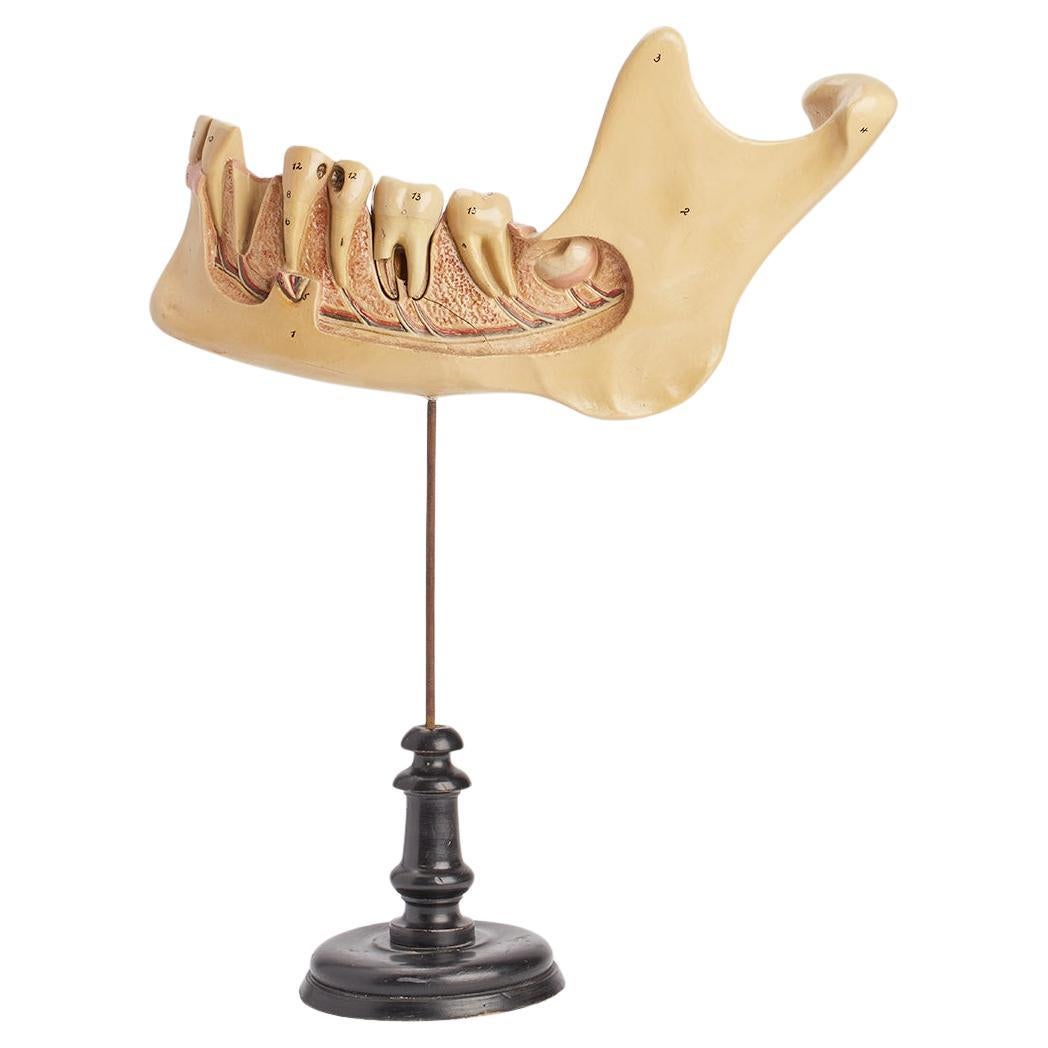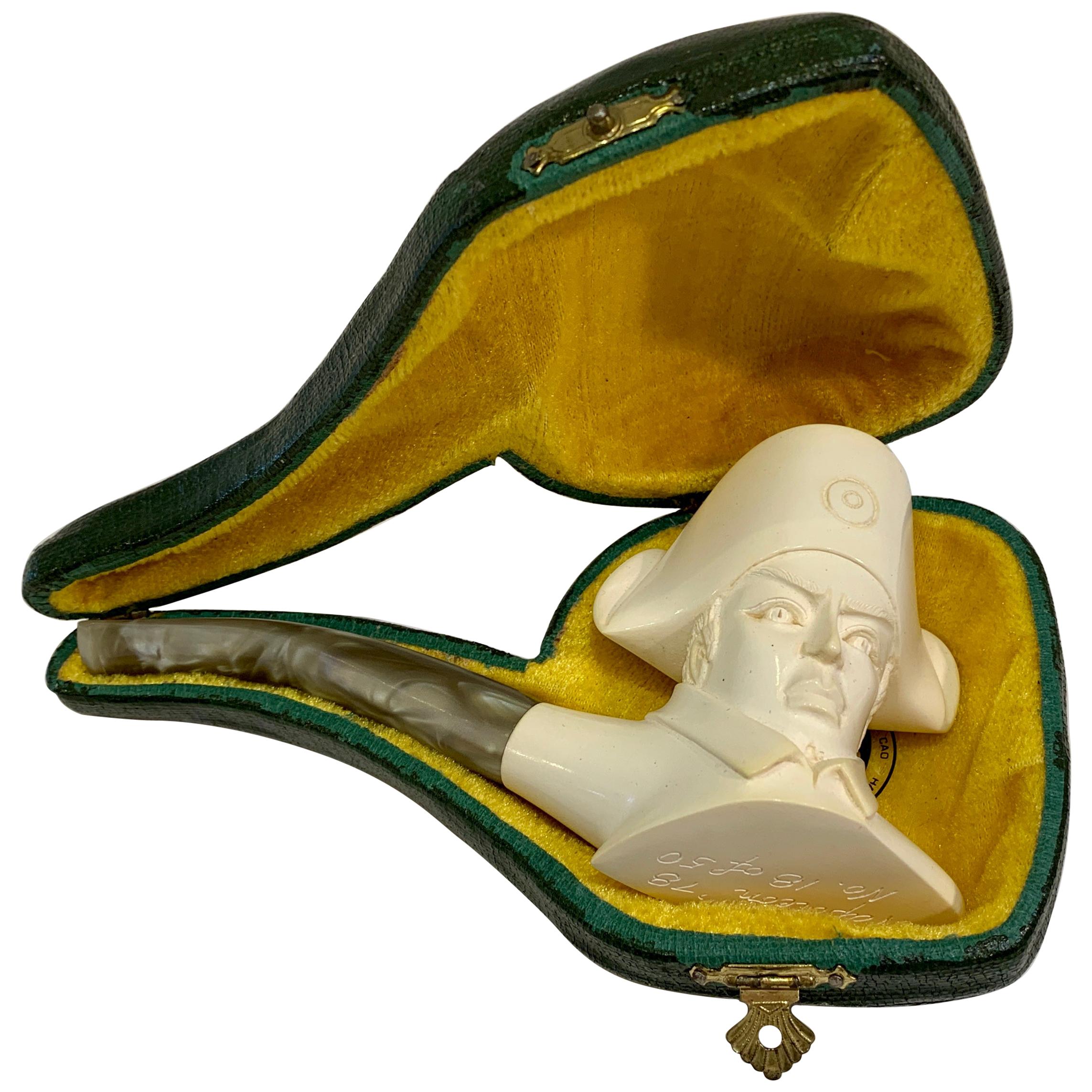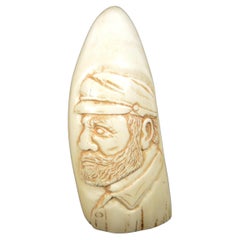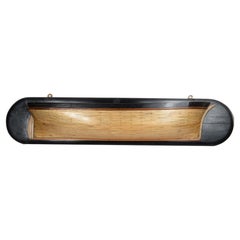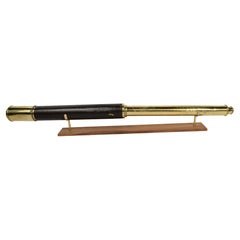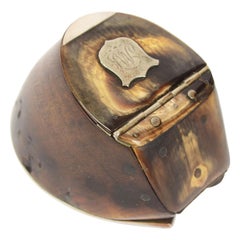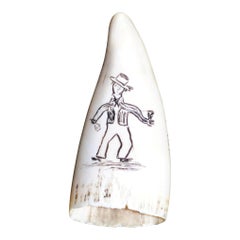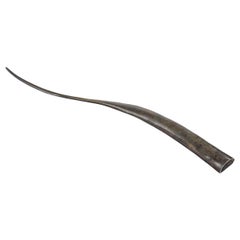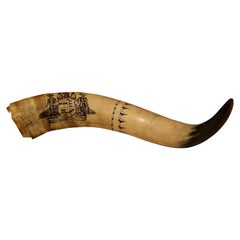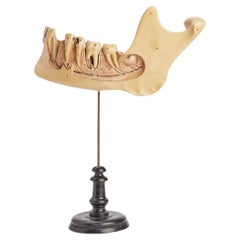Items Similar to Scrimshaw of engraved whale tooth depicting the Captain F. Swain 1850
Want more images or videos?
Request additional images or videos from the seller
1 of 13
Scrimshaw of engraved whale tooth depicting the Captain F. Swain 1850
$2,632.75
£1,955.69
€2,200
CA$3,632.06
A$3,992.63
CHF 2,098.34
MX$48,485.07
NOK 26,176.31
SEK 24,800.21
DKK 16,747.54
About the Item
Scrimshaw of an engraved whale tooth, depicting on one side the half-bust of the smartly dressed and handsome Captain F. Swain. On the Back the inscription Master The WHALER SWAN framed by a rich cartouche. Datable to around the mid-19th century.
Bon état. Measures 10x3.5x3 inches 4x1.4x1.3.
The word scrimshaw refers to an art form (and the various products of this art) that developed aboard American whaling ships between 1745 and 1759 as a means of recreation to occupy time during the long hours aboard; this art form consisted of a process of carving and carving whale bones and teeth, with which a wide range of both everyday and ornamental objects were made, which were usually made as souvenirs for members of one's family. Nella scelta dei materiali il primo era sicuramente il dente d'avorio del capodoglio. Solo la punta del dente era liscia ed era necessario preparare il resto della superficie ruvida lucidandola. Il dente era ben immerso in acqua salata o calda, spesso con l'aggiunta di potassio. Quindi veniva utilizzata una lima per strofinare e arrotondare la superficie, e infine una carta vetrata fine per completare il processo. L'ultima fase della lucidatura veniva eseguita con pomice o cenere e poi il dente veniva strofinato ancora con il palmo della mano. Each step had to be performed very slowly so as not to affect the smooth surface of the tooth. In terms of subjects for scrimshandering, the most common were a drawing of a ship or scenes of cetacean capture, made with a needle or knife, or an appropriate blade: for example, thanks to Herman Melville we know that some whalers had boxes of dentist's tools specially designed for scrimshandering. The origin of scrimshandering, as the whalers called it, i.e., the art of making scrimshaw, is a mystery: theories range from locating its origin in Eskimo culture or with Native Americans to emphasizing the influence of South Sea islanders. La spiegazione di Edouard A. Stackpole (1903 -1993), giornalista americano, scrittore e storico di caccia alle balene, è forse la più plausibile: lo scrimshaw sarebbe stato semplicemente lo sviluppo marittimo dell'antica arte di intagliare l'avorio, così come era stata praticata per secoli, e in quanto forma d'arte popolare non sarebbe stato altro che un adattamento da parte dei balenieri americani di un antico mestiere.
- Dimensions:Height: 4 in (10.16 cm)Diameter: 1.4 in (3.56 cm)
- Materials and Techniques:Teeth
- Period:
- Date of Manufacture:1850
- Condition:Wear consistent with age and use.
- Seller Location:Milan, IT
- Reference Number:1stDibs: LU1020237661032
About the Seller
5.0
Vetted Professional Seller
Every seller passes strict standards for authenticity and reliability
Established in 1999
1stDibs seller since 2014
398 sales on 1stDibs
Typical response time: 1 hour
- ShippingRetrieving quote...Shipping from: Milan, Italy
- Return Policy
Authenticity Guarantee
In the unlikely event there’s an issue with an item’s authenticity, contact us within 1 year for a full refund. DetailsMoney-Back Guarantee
If your item is not as described, is damaged in transit, or does not arrive, contact us within 7 days for a full refund. Details24-Hour Cancellation
You have a 24-hour grace period in which to reconsider your purchase, with no questions asked.Vetted Professional Sellers
Our world-class sellers must adhere to strict standards for service and quality, maintaining the integrity of our listings.Price-Match Guarantee
If you find that a seller listed the same item for a lower price elsewhere, we’ll match it.Trusted Global Delivery
Our best-in-class carrier network provides specialized shipping options worldwide, including custom delivery.More From This Seller
View AllRaro scrimshaw di grande dente di balena in verticale a bassorilievo un marinaio
Located in Milan, IT
Raro scrimshaw di un grande dente di balena raffigurante in verticale a bassorilievo il profilo di un baleniere barbuto e con cappello in testa, altezza cm 16. Databile attorno alla...
Category
Antique 1850s Nautical Objects
Materials
Teeth
Second half of the 19th century half-hull of an English schooner wooden
Located in Milan, IT
Second half of the 19th century half-hull of an English schooner wooden planking nailed and mounted on ebonized wooden board.
Good condition, board measures 100x 13x21 cm - inches...
Category
Antique 1870s Nautical Objects
Materials
Wood
Brass round section telescope with leather handle England 1850s
Located in Milan, IT
Brass round-sectioned telescope with leather-covered handle, focusing at one extension.
English manufacture of the mid-19th century.
Complete with base for support made of custom woo...
Category
Antique Mid-19th Century Nautical Objects
Materials
Brass
Late 19th Century antique Snuff Box Made in a Horse's Hoof with Horn Lid
Located in Milan, IT
Snuff box made in the late 19th century in a horse's hoof and horn lid, horseshoe base of chromed metal. Metal label on the lid engraved with the owner's initials MB...
Category
Antique Late 19th Century British Tobacco Accessories
Materials
Bone, Horn
Brass round section telescope with leather-covered handle 1850
Located in Milan, IT
Brass round-section telescope with leather-covered handle, two-extension focus.
English manufacture from the mid-19th century.
Complete with base for support made of custom wood and ...
Category
Antique Mid-19th Century Nautical Objects
Materials
Brass
Small carved wooden figurehead depicting young Moretto Venice late 19th century
Located in Milan, IT
Small carved wooden figurehead depicting young Moretto, mounted on red marble base, late 19th-century Venetian manufacture.
This is a beautifully crafted sculpture made of polychrom...
Category
Antique 1890s Nautical Objects
Materials
Wood
You May Also Like
19th Century Irish Folk Art Whale Tooth
Located in Coeur d'Alene, ID
Irish Folk Art. This sperm whale tooth was etched during the 19th century, in Ireland. There'sa a drinking sailor on one side, and a barmaid on the other -...
Category
Antique Late 19th Century Northern Irish Nautical Objects
Materials
Other
Rare Scrimshaw Decorated Horn
Located in Lymington, Hampshire
A rare scrimshaw decorated horn, engraved over one side with the Royal Arms countersigned and titled ship profiles for the Great Eastern, the Great Britain,...
Category
Antique 1860s English Nautical Objects
Materials
Horn
19th Century English Scrimshaw Steer Horn with Black Armorial Crest Engraving
Located in Dallas, TX
Decorate a man's office with this fine, antique scrimshaw steer Horn. Found in England, circa 1870, the Horn flaunts impressive engraving work and ov...
Category
Antique Late 19th Century English More Desk Accessories
Materials
Horn
A jaw with teeth made of painted papier-maché, Italy 1880.
Located in Milan, IT
Anatomical model for schools for educational use depicting a jaw with teeth, made of painted papier-mâché, all placed with the support of a cylindrical iron rod on a round base in bl...
Category
Antique Late 19th Century Italian Scientific Instruments
Materials
Iron
Unique Ismet Bekler CAO Napoleon Meerschaum Pipe Hand Carved Limited Edition
Located in Tustin, CA
Outstanding, limited edition, hand carved, estate European Turkish meerschaum pipe is in unused, pristine condition and is a rare and very fine smoking collectable for a pipe aficion...
Category
Vintage 1970s Turkish Tobacco Accessories
Materials
Other
Authentic Carcharodontosaurus Tooth in Display Box .75" x .5" x 4.75, " 26 Grams
Located in New York, NY
Carcharodontosaurus (Dinosaur) tooth in a glass display box From Tegana Formation, North Africa.
Cretaceous Age 65 million years
Carcharodontosauru...
Category
Antique 15th Century and Earlier African Natural Specimens
Materials
Other
$320 Sale Price
20% Off
